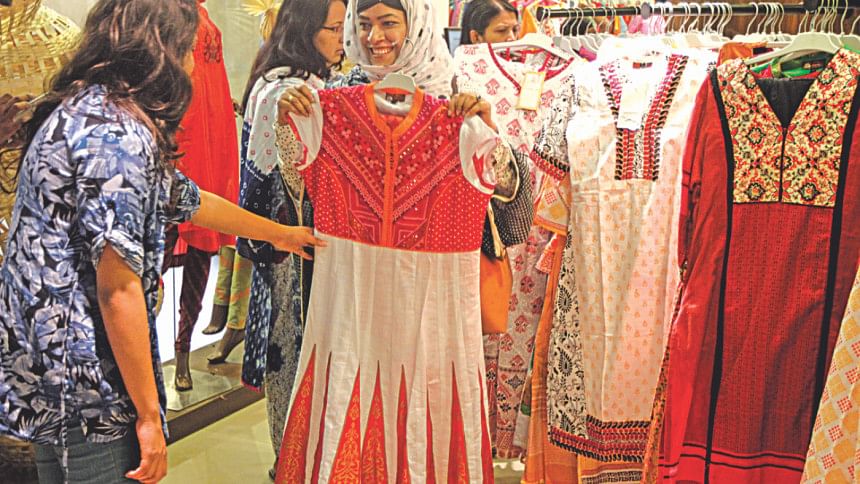Baishakh brings hope for boutique houses

Despite the blanket of unease over the country, fashion houses are banking on Pahela Baishakh, the first day of Bangla New Year, to bring them some cheer and set the tone for the rest of the year.
"We have already completed our preparations to meet the customers' demand for Baishakhi clothes," said Mohammad Abdur Rouf, chief operating officer of Aarong, a leading fashion and lifestyle brand of the country.
The company has brought out a wider array of designs this time with an eye on the festival, which is celebrated on April 14 every year.
Aarong is aiming to register 10-15 percent higher sales than the previous year as the BNP-led-20-party alliance has eased off hartals in Dhaka and Chittagong for the upcoming city corporation elections, he added.
Tonuja Rahman Maya, owner of the Jessore-based Rong Handicrafts, too is upbeat about higher sales this time.
"During the last three months, people have almost stopped buying clothes. We are expecting good sales in the next two weeks since the political environment is gradually improving."
Maya, who was recently given the 'Best Woman Entrepreneur of the Year' award from the Jessore region by the SME Foundation, said her company aims to log in around Tk 20 lakh in sales over the next ten days through its three stores in Jessore.
Over the years, Baishakh has become the second biggest event for the country's thousands of boutiques after Eid-ul-Fitr.
Unlike the festivities during Eid or Puja, Pahela Baishakh is an occasion for people from all walks of life, irrespective of religion, race or creed. People generally buy panjabi, fatua, sari and salwar kameez for the festival.
"It is an important season for us as customers generally buy locally-made clothes for the occasion," said Azharul Haque Azad, president of Fashion Entrepreneurs Association of Bangladesh that represents more than 50 boutiques.
Last season, fashion houses across the country raked in around Tk 1,500 crore in sales, up 10 percent from the previous season, he said.
"But this year, we will be happy to just have a repeat of last year's sales volumes -- we are not even hoping anything better than that."
Fashion houses and boutiques registered around 60 percent year-on-year drop in sales during the January-March period, mainly for political unrest, said Azad.
This year, deadly violence on the streets has frightened customers and shutdowns hit everybody in the supply chain, including the handloom owners, he added.
The sector has incurred losses of around Tk 1,000 crore in the last three months due to the political turbulence, according to Azad.
The country has now around 50 lakh weavers, he said, adding that the volatile political environment has particularly affected the small weavers as boutique owners cut their productions by half during January and February.
The political situation influences people's purchasing sentiment, said Azad, who is also the managing director of Shada Kalo, a leading fashion house.
The prolonged political unrest, which has choked off regular income, has forced many businesses and individuals to dip into their savings, which has severely affected their purchasing power, he said.
Many non-resident Bangladeshis usually come to the country and buy locally-designed attire to celebrate Baishakh. Such arrivals are not being expected this year for the political unrest, said Rouf.
At present, the country has around 4,500 fashion houses that sell locally produced attire with a yearly turnover of Tk 6,000 crore, according to the president of Fashion Entrepreneurs Association of Bangladesh.
Of the annual sales figure, Pahela Baishakh's clothing sales account for 25 percent and the month of Ramadan another 50 percent, he said.
Soumik Das, managing partner of Rang, another leading fashion house that has 14 stores across the country, said cotton clothes are the most popular ones during this season.
He said the price of clothing did not soar this year. "We have made products targeting the middle-class people."
Rang is now selling each piece of panjabi at Tk 800-3,500, sari Tk 850-5,000 and salwar kameez Tk 1,500-5,500, said Das.
Several financial institutions have also engaged in promoting sales during Baishakh by partnering with the leading fashion houses, a move which is expected to boost sales.
For example, MasterCard has already launched a flat discount of 10 percent for all its debit and credit cardholders, which can be used at the individual outlets of leading brands such as Nipun, Shrishty, Kay Kraft, Anjan's, Rang, Banglar Mela, Sadakalo, Bibiana and Nogordola.
This campaign is expected to boost Baishakhi sales as well as promoting electronic payments in the country, Syed Mohammad Kamal, country manager of MasterCard Bangladesh, said in a statement.
Aarong, which has 13 outlets across the country, is also offering 10 percent discount on purchases made through American Express cards, said Rouf.
Many customers, however, have not yet finalised whether or not to buy clothes for Pahela Baishakh.
"Even though I bought a salwar suit for Baishakh last year, this year I have not gone out much except for work because of the fear of violence," said Anashua Ananga, an economics lecturer at the Bangladesh University of Professionals.
"I might decide to buy clothes this year if the situation improves," she added.

 For all latest news, follow The Daily Star's Google News channel.
For all latest news, follow The Daily Star's Google News channel. 



Comments